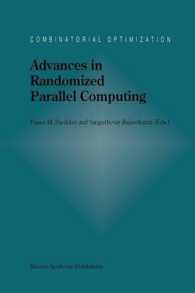Full Description
Helicopters suggest a range of images, from medical support and military action to traffic reporters and tourism. Unfortunately, in higher education helicopter evokes the image of parents who hover continuously and land when they perceive a need from their college student. Some administrators have even characterized aggressive parents as Black Hawk helicopters. This negative image of parental involvement can prevent college and university administrators from capitalizing on its opportunities. Federal financial policies, parental notification policies regarding alcohol use, the No Child Left Behind Act, and even college students themselves expect parents to be involved. Their experience in elementary and secondary education can make parents a valuable resource; however, administrators are often unsure how best to support the rights of students as adults and at the same time maximize the beneficial influence of parents.This volume examines the influence and impact of parental involvement on student development; the critical messages for parents to understand about their role within the university and with their student; the types of programs offered for parents, including parent associations and advisory boards; advocacy and crisis management; parent program offices and needs assessment; and legal aspects of parent outreach. This is the 122nd volume of the Jossey-Bass quarterly report series New Directions for Student Services , an indispensable resource for vice presidents of student affairs, deans of students, student counselors, and other student services professionals. Each issue of New Directions for Student Services offers guidelines and programs for aiding students in their total development: emotional, social, physical, and intellectual.
Contents
EDITOR'S NOTES ( Karla C. Carney-Hall ). 1. Understanding Current Trends in Family Involvement ( Karla C. Carney-Hall ) As parental involvement increases, administrators must understand the underlying reasons in order to address concerns and provide appropriate responses and services. 2. Exploring the Impact of Parental Involvement on Student Development ( Deborah J. Taub ) Administrators are often concerned about the potentially negative impact of parental involvement on student development and autonomy. This chapter reviews those concerns in light of student developmental theory and related research. 3. Using Purposeful Messages to Educate and Reassure Parents ( Jerry Price ) Managing parental involvement begins with clear, consistent messages to parents about their role and their influence. This chapter outlines general messages and specific areas of concern based on institutional characteristics and parental, student, and administrative needs. 4. Capitalizing on Parent and Family Partnerships Through Programming ( Jeanine A. Ward-Roof, Patrick M. Heaton, and Mary B. Coburn ) Increasing parental involvement not only affects institutional messages, but also shapes what kind of programming is offered to parents. Programming includes events and communication through newsletters, guides, and web sites, as well as parent associations and advisory boards. 5. Managing Parent Involvement During Crisis ( Lynette S. Merriman ) A parents' primary goal in contacting an institution is to solve problems, often during a time of crisis for the student or family. This chapter focuses on problem-solving skills needed and planning required for communication during a crisis. 6. Developing, Staffing, and Assessing Parent Programs ( Marjorie Savage ) Serving parents requires time and energy, and ultimately affects staffing. Whether institutions decide to create a separate office and parent associations to serve parents depends on needs assessment, philosophy, and resources. 7. Navigating State and Federal Student Privacy Laws to Design Educationally Sound Parental Notice Policies ( Thomas R. Baker ) This chapter describes federal and state privacy laws, FERPA, changes in disclosure regarding health emergencies, and legal issues concerning students younger than eighteen. Appendix A: Parent Program Survey. Appendix B: Sample Parent Letters. INDEX.








